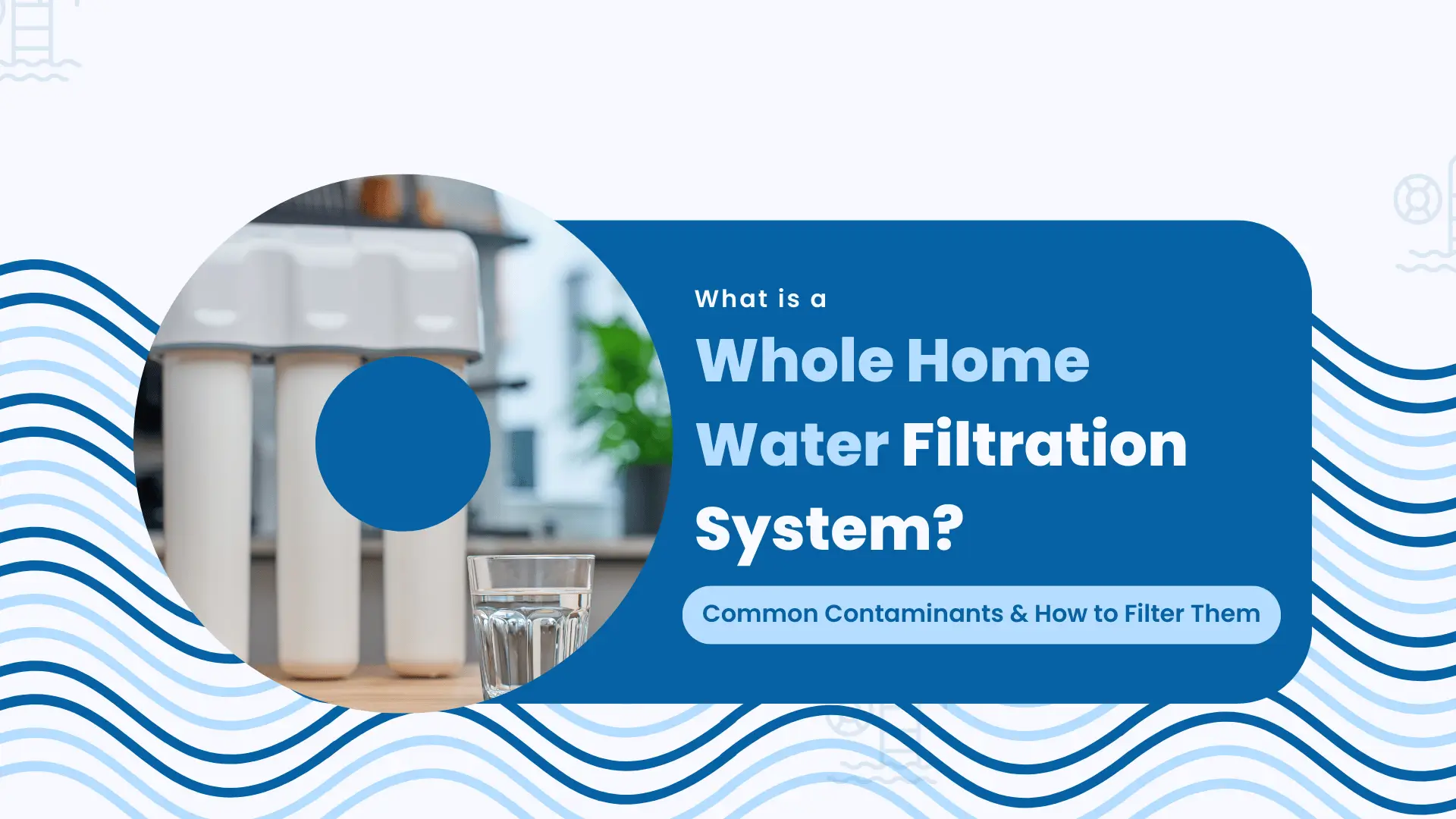Water is something most of us take for granted. We turn on the tap and expect it to be clean, safe, and ready to use. But if you live in Houston, you know the story is more complicated. Between hard water minerals, chlorine, and even emerging contaminants like PFAS, the water in your home might be doing more harm than good—to your health, your appliances, and even your wallet.
That’s where whole home water filtration systems step in. Let’s take a deep dive into what they are, what problems Houston residents face with their water, and how you can filter out contaminants to protect both your family and your home.
What is a Whole Home Water Filtration System?
A whole home water filtration system (sometimes called a point-of-entry system) is designed to filter all the water entering your house. Instead of attaching filters to individual taps, these systems are installed at the main water line. That way, every faucet, shower, washing machine, and dishwasher benefits from clean, treated water.
Think of it as giving your entire home a “first line of defense” against contaminants before they ever reach you.
Why Houston Water Needs Extra Attention
Houston’s water supply comes from both surface water (like lakes and reservoirs) and groundwater sources. While the city meets federal safety standards, those standards don’t always account for everything that can be in your water. Many Houstonians notice hard water stains, chlorine taste, and in some cases, concerns about industrial contaminants.
Here are the main culprits:
1. Hard Water Minerals (Calcium & Magnesium)
Houston is notorious for hard water. You’ll see the evidence as white crust on faucets, cloudy dishes, and stiff laundry. Inside your appliances, mineral buildup shortens the lifespan of water heaters and dishwashers. For your skin and hair, hard water can leave things dry and dull.
2. Chlorine
The city adds chlorine to disinfect water, killing bacteria and viruses. While that makes the water safe from pathogens, chlorine can cause skin irritation, dry hair, and an unpleasant swimming-pool smell in showers.
3. PFAS (“Forever Chemicals”)
PFAS are man-made chemicals found in firefighting foams, industrial waste, and even some consumer products. They don’t break down easily and can accumulate in water supplies. Studies link PFAS exposure to immune system issues, liver damage, and increased cancer risk.
4. Sediment and Rust
If your home has older plumbing or you live in an area with frequent construction, sediment and rust particles can end up in your water. This not only affects taste but can also clog faucets and wear down appliances.
5. Other Contaminants (Lead, VOCs, Nitrates)
While not as common in every Houston neighborhood, lead from old pipes and volatile organic compounds (VOCs) from industrial runoff are concerns. These can affect brain development in children and cause long-term health problems.
How These Contaminants Affect Daily Life
- Health: Dry skin, stomach issues, long-term risks like PFAS exposure.
- Appliances: Mineral buildup kills water heaters and coffee makers early.
- Home surfaces: Hard water stains glass, tile, and fixtures.
- Taste & Smell: Chlorine leaves water smelling like a pool.
The bottom line: even if water is “legally safe,” it may not be ideal for your health or your home.
How to Test Your Water in Houston
Before you decide on a filter, you should know what’s in your water. Options include:
- At-home test kits: Affordable and simple but usually only test for basics like hardness and chlorine.
- Professional lab testing: Gives a detailed report of contaminants, including PFAS and heavy metals.
- Free local water testing: Companies like Aquapure offer free water testing and quotes, so you know exactly what you’re dealing with.
Solutions: Types of Filters and Softeners
Different contaminants need different solutions. Here’s a breakdown:
1. Water Softeners for Hard Water
A water softener removes calcium and magnesium, replacing them with sodium or potassium. This prevents scaling, extends appliance life, and makes your skin and hair feel smoother.
👉 Learn more about Aquapure’s water softener installation.
2. Carbon Filters for Chlorine and VOCs
Activated carbon filters absorb chlorine, bad tastes, odors, and many organic chemicals. These are especially useful for Houston’s chlorinated water.
3. Reverse Osmosis (RO) Systems for PFAS and Heavy Metals
RO systems force water through a semi-permeable membrane that blocks contaminants like PFAS, lead, and nitrates. They’re often used in combination with other filters.
4. Sediment Filters for Dirt and Rust
These filters capture sand, rust, and debris before it can damage your plumbing or appliances.
5. UV Purification for Microorganisms
While Houston’s chlorination kills most pathogens, UV light purification can act as a chemical-free backup to ensure bacteria and viruses are neutralized.
Why Many Houston Families Choose Aquapure
Now, let’s connect the dots. Filtering your water is important, but who you trust for installation and service matters just as much. Here’s why Houston residents often choose Aquapure:
- Free installation and support: Certified technicians handle setup and maintenance so you don’t have to stress.
- Easy financing: Flexible payment plans make it affordable.
- $0 down, buy now – pay later: No upfront costs; you can start enjoying clean water immediately.
- Lifetime warranty: A system built to last, backed for life.
- Texas owned, family operated: A Houston business that understands local water challenges.
- 10+ years of trust: Serving Houston families for over a decade.
- Customized solutions: Whether you need a softener, filter, or both, Aquapure tailors the system to your home’s unique needs.
👉 Explore whole-home water filtration systems.
Call-to-Action: Take the First Step
If you’ve been dealing with hard water stains, chlorine smells, or worries about PFAS, it’s time to get answers. Aquapure offers free water testing and quotes, so you’ll know exactly what your water needs.
Get started today and protect your family, your appliances, and your home with water you can truly trust.
FAQ: Whole Home Water Filtration in Houston
Q1: Does Houston have safe drinking water?
Yes, it meets federal standards. But standards don’t cover everything. Many families still experience issues like hard water, chlorine, or PFAS.
Q2: Will a whole home system remove Houston’s hard water stains?
Yes, if you include a water softener. Softening eliminates the calcium and magnesium that cause stains and buildup.
Q3: Can I install a system myself?
While DIY options exist, most Houston homeowners prefer professional installation to ensure the system is set up correctly and backed by warranty. Aquapure provides free professional installation.
Q4: What’s the difference between a softener and a filter?
A softener targets hard water minerals, while filters target contaminants like chlorine, PFAS, or sediment. Many homes benefit from using both.
Q5: How much does a system cost in Houston?
It depends on your water quality and home size. With Aquapure, you can get started with $0 down payment and flexible financing.
Q6: Will a filtration system make my tap water taste better?
Absolutely. Removing chlorine and other impurities improves taste and smell significantly.
Q7: How often does a system need maintenance?
Most systems need minimal upkeep. With Aquapure, maintenance and support are included for a worry-free experience.
Final Thoughts
Water isn’t just something you drink—it touches nearly every part of your life at home. In Houston, hard water and chemical contaminants are real issues, but the good news is they’re also solvable. A whole home water filtration system ensures your family enjoys clean, safe, and great-tasting water while protecting your appliances and plumbing.
With trusted local experts like Aquapure offering free water testing, $0 down financing, lifetime warranty, and customized solutions, Houston families can finally enjoy water the way it should be—pure, healthy, and stress-free.



